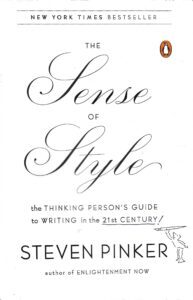Pinker Reduces the Stress of Style

Steven Pinker. 2014. The Sense of Style. New York. Penguin Books.
Review by Stephen W. Hiemstra
Confession time. I own a lot of style books, not only in English but also in Spanish and German. Many more people speak English as a second language leaving it open to borrowed vocabulary and, perhaps, a more complex structure. The need for style books may accordingly be more pressing for English writers. Or, I may just be a language geek. Who knows?
IntroductionIn his prologue to The Sense of Style, Steven Pinker writes:
“My discomfort with the classic style manuals has convinced me that we need a writing guide for the twenty-first century….Today’s writers are infused by the spirit of scientific skepticism and the ethos of questioning authority….They rightly expect reasons for any advice that is foisted upon them….This books is also written for readers who seek no help in writing but are interested in letters and literature and curious about the ways in which the sciences of mind can illuminate how language works at its best.” (6-7)
Pinker believes that style matters because it aids communication, builds trust, and contributes to beauty (8-9). Who can say?
Background and OrganizationSteven Pinker graduated from Dawson College and McGill University. His doctorate in experimental psychology at Harvard University. He then did postdoctoral work Massachusetts Institute of Technology before teaching at Harvard University and Stanford University. He has written a number of books, both technical and popular, and writes frequently for various periodicals.
Pinker writes in six chapter:
Good writingA window onto the worldThe curse of knowledgeThe web, the tree, and the stringArcs of coherenceTelling right from wrong (v-vi)These chapters are preceded by a prologue and followed by acknowledgments, glossary, notes, references, and an index.
A Clear ConversationStyle goes beyond semantics, grammar, and structure. Pinker writes: “The best words not only pinpoint an idea better than any alternative but echo it in their sound and articulation, a phenomena called phonesthetics, the feeling of sound.” (22)
It seems odd that a psychologist should deliberatively step into the haunts of an English teacher. There is a reason that everyone remembers the same of their high school English teacher. “Bad writing makes the reader feel like a dunce,” (36) Pinker cautions. Correcting bad writing makes the writer look for the door—an important reason why high school English teachers are so memorable.
“Classic style is confident about its own voice,” Pinker observes before starting a conversation about “compulsive hedging,” (43) the bane of weak writers. We begin to wonder whether Pinker sees writing critiques as an insidious slant on a Rorschach test. Communicating requires a serious commitment of time and often accompanies economic activity, suggesting that clarity is more than a random objective—natural fodder for a research psychologist. Who’d a thunk?
Sentence Diagramming on SteroidsBefore you venture into Pinker’s chapter on The Web, The Tree, and The String, you might want to pour yourself a pitcher of coffee and have your spouse chain you to your desk. On the other hand, if you loved diagramming sentences in high school, chances are good that you will become a Pinker groupie reading this chapter.
The structure of language is called syntax. Pinker writes about syntax as:
“…a tree of phrases to translate a web of thoughts into a string of words. Upon hearing or reading the string of words, the perceiver can work backwards, fitting them into a tree and recovering the links between the associated concepts.” (82)
When we speak a language, it means that we intuitively know the rules for parsing words into meaningful expressions, which will call parts of speech. Diagramming all these things makes it possible, as Pinker describes and shows with pictures, to understand the relationship among these parts of speech and to identify simple and complex structures, how they work, and how they break down with unclear speech.
AssessmentSteven Pinker’s The Sense of Style is an interesting and artful read. Frequently, especially in the final chapter covering disputable words and phrases, Pinker helped clarify points, like the use of who and whom, that I have debated with my editors. While the debates will continue, Pinker’s insights will help reduce the shame and guilt that I have felt for not making my high school English teacher proud. Reading Pinker may help reduce stress levels for future students, teachers, editors, and writers who read this work.
Footnoteshttps://en.wikipedia.org/wiki/Steven_....
Pinker Reduces the Stress of StyleAlso see:Books, Films, and MinistryOther ways to engage online:Author site: http://www.StephenWHiemstra.net Publisher site: http://www.T2Pneuma.com Newsletter at: https://bit.ly/bugs_25, SignupThe post Pinker Reduces the Stress of Style appeared first on T2Pneuma.net.



